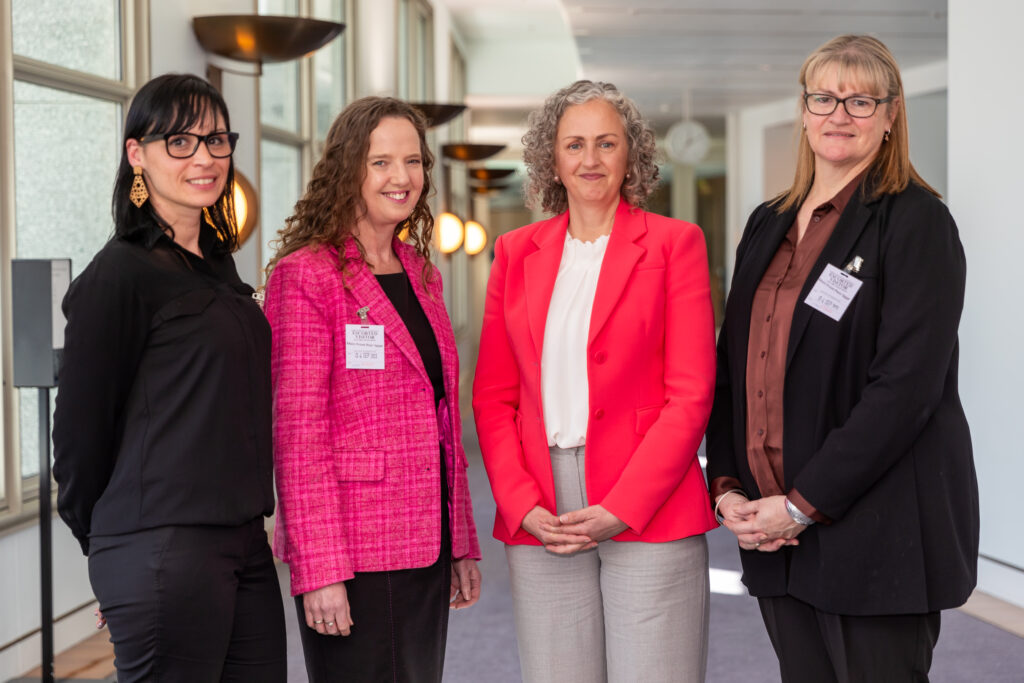
Gowrie Victoria was part of a contingent advocating for wage increases for the early education and care sector through a national education and care multi-employer agreement in Canberra last month.
Two representatives from Gowrie Victoria and two from Gowrie NSW attended the Early Childhood Education Roundtable, along with a range of experts and policymakers, including Victorian Senator Jess Walsh and Minister Anne Aly.
Sue Chamberlain-Ward, People and Culture Executive Manager at Gowrie Victoria, said the event was in response to the first national application for multi-employer bargaining in the early childhood sector and allowed attendees to share their insights on how the agreement could address the workforce crisis.
Earlier this year, Gowrie Victoria joined 60 other employers and the early education unions to put in an application to the Fair Work Commission for permission to use these laws to make a new workplace agreement.
Gowrie Victoria CEO Susan Anderson said the aim was for employers, unions, and the government to work together to set a new standard in wages and conditions for early childhood educators which could be extended to the rest of the early childhood sector.
“We believe that a well-remunerated, professional sector will support our employees and deliver better early learning outcomes for children and families,” Susan said. “We chose to join this application to Fair Work because we want to have Gowrie’s voice heard at this important time for the sector. We are committed to advocating for better wages and conditions for our teams and the sector and will be investing our time in this important next step.”
Sue said the application and the recent Roundtable were helping to change the narrative around the workforce crisis in early childhood education and care.
“At the Roundtable, we spoke about why multi-employer bargaining is a real opportunity to fix the workforce crisis in our sector,” she said. “A stable, qualified, professionally paid workforce would have enormous benefits for children and families, particularly vulnerable children, as well as broader social benefits.”
Sue said the situation had become dire and pointed out an alarming 80 per cent drop in applications over the past three years.
“The sector has been facing numerous challenges, including low wages and the increased complexity of dealing with behavioral issues, particularly in the aftermath of the COVID-19 pandemic,” she said. “These challenges have led to high turnover rates in the sector, making it difficult for children to form stable attachments, which, in turn, can exacerbate behavioral issues.”
The Roundtable contingent was heartened to see their message well-received, with decision-makers showing openness to the proposed solutions.
The case for multi-employer bargaining became evident in the discussions:
The sector faces a crisis with low wages, staff shortages, high fees, and inadequate childcare spaces.
Nationwide, there is a demand for at least 30,000 more educators and 7,000 teachers.
Multi-employer bargaining enables early childhood services to collectively negotiate for better wages and conditions, simplifying the process.
It presents an opportunity to involve the government as the primary funder in negotiations.
Multi-employer bargaining is seen as an efficient way to raise wages without adding costs to families.
Recent developments include the passage of the Secure Jobs, Better Pay Bill by the Federal Government, establishing a ‘supported bargaining stream.’ In June, organizations like the Community Child Care Association (CCC) joined early education unions and peak bodies to apply for authorisation to bargain under these new laws, covering 64 employers and 12,000 employees.
The next steps involve awaiting a decision from the Fair Work Commission to confirm negotiations for the first multi-employer agreement. Once confirmed, negotiations will begin, with a request for the Federal Government’s participation. The long-term goal is to establish a model benefiting the entire education and care sector.